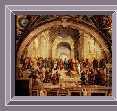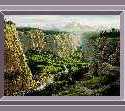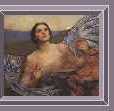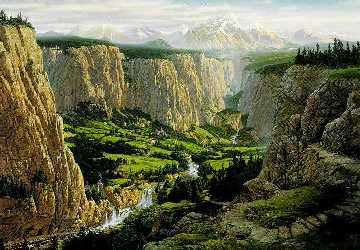The Final Frontier
Disclaimer: My forte is Fantasy, more than Science Fiction, but having read some of each, I thought I'd give you reviews in case you'd like to cross over to another genre. Recommendations are more than welcome, as always. You can either e-mail me or drop a note over at Phantasmagoric Miscellanea, a web based bulletin for the Christian Guide to Fantasy. Thanks!

Orson Scott Card
A cross-genre author (including horror, fantasy and theory), OSC is best known for his Science Fiction, particularly, Ender's Game. The below link leads to the book, however, the short story is quite as interesting and can be found in anthologies of his work.
Speaker for the Dead had potential but compressed way too much story into too little space with too much weirdness around it -- interesting mentions of some kind of revived Calvinism, plus a lot of stuff on Catholicism that wasn't outright Catholic-bashing, but it couldn't decide what it was -- lots of questions, no resolution. One particular element that bothered me was a Catholic religious order whose members had to be married but celibate called the Children of the Mind of Christ -- I never did figure out what that was about.
Xenocide -- same religious problems, with the addition of an alien civilization that couldn't quite decide if it what it was doing was a religion or just a way of living. Fairly good story, but the religion stuff detracted.
Children of the Mind -- fairly good adventure story, except that he tagged another alien civilization on at the end and left it just as they were discovering it. Same religious confusion, plus the addition of philotic something-or-others that are supposedly the smallest subatomic thingy in existence, except that some of them are also souls -- odd stuff that's even more confusing than the rest of the religious stuff.
Basically I don't think I recommend reading past Ender's Game, for those looking just for reading material. (People with Honors syndrome are another matter altogether!)
Douglas Adams
For anyone who's ever wondered why people snigger at the number "42," a refreshment course on Doublas Adams is required. Extremely witty, extraordinarily funny (think England meets Dilbert), Adams has been delighting readers for generations. Alas, however, after the second or third reading (i.e., once the stitch in your side from laughter has eased), the astute reader will realise that the author is also very, very aetheistic. Following in the line of the existentialist and absurdist authors, it's easy to merely write off Adam's wacky humour as mere fun. But it's more than that when he constantly attacks God, His power and existence. Therefore, although his books (the first three in the trilogy in particular), are heartily recommended, I beg you to keep your thinking cap on and perhaps something solidly Christian by your bedside to read as a remedy after each novel.
His duology, about Dirk Gently, a Holistic Detective, are negligible. Not only are they horrid theologically (what was funny aetheism in THGTTG is morose here), but their plots make absolutely no sense whatsoever (which, I suppose, is the point).
Anne McCaffrey
A prolific authoress, and one who's work has come under considerable question as to whether it's more science fiction with a fantasy cover or vis versa, her books have remained immensley popular both lovers of fantasy and of science fiction. Our own Colleen McAndrew has written a brief primer to her work.
(c) 2000
 Ender's Game
Ender's GameLiterary Quality:
From my Amazon review:I first read the short story that "Ender's Game" the novel is based on a-way back when in college when my roommate foolishly left out an omnibus of Card's short stories while I was attempting to finish writing a paper. The result was inevitable: I read the story - and fell in love.
Needless to say, I was *thrilled* when the World Fantasy Convention felt the need to distribute free copies of the novel, complete with a terribly interesting introduction from the author himself. However, there were things to do and places to be, and ultimately I was required to wait until my father had finished pouring over it to read the thing myself.
The wait was worth it. Card has beautifully transferred and expanded his short story to novel form - a difficult feat at best. Still following the young boy Ender as he is taken into space to learn how to be a military genius - thus questioning the role of children, what they can bear and what they should bear. He uses the length well: delving into Ender's home-life, detailing his first games, playing with threads of philosophy, and keeping the reader absolutely glued to his seat - even if he already knows the story from reading the original.
Oh, sure, there are a few objections: Mazur's role is humanised, softened, resulting in a slight loosening of the ending tensions. And it would have been nice if Card had lingered just a smidgen longer on the brother' and sister's plot. And - the largest ojection of all - the last chapter's introduction of the odd quasi-religion Ender adopts as the newfound "Speaker of the Dead" is poorly realised, tacked on, and reeks of its sequel. (And a word of warning to parents: the book does deal with some adult issues, and includes a fair amount of violence.)
But even these objections cannot completely override a hearty recommendation of Card's classic "Ender's Game." Whether you're a lover of science fiction, fantasy (yes, fantasy - he world-builds like nothing else), mystery, adventure, or just a fan of good plot in general - you could do no better than to make "Ender's Game" the next novel on your bedtable.
Christian Morality: Good/Dangerous
Age Appropriateness: Teenager Thoughts from Colleen McAndrew:
Thoughts from Colleen McAndrew:The Increasingly Ill-Named Hitchiker's Guide to the Galaxy Trilogy
 The Hitchiker's Guide to the Galaxy
The Hitchiker's Guide to the Galaxy
 The Restaurant at the End of the Universe
The Restaurant at the End of the Universe
 Life, the Universe, and Everything
Life, the Universe, and Everything
 So Long, and Thanks for All the Fish
So Long, and Thanks for All the Fish
 Mostly Harmless
Mostly HarmlessLiterary Quality:
Like Monty Python, these classic books have spawned several instantaneously recognised punchline jokes. Rather than "Nee!" there's "42," rather than "It's just a flesh wound," there's "Oh, no, not again!" Following a ridiculous group of expatriates and loonies throughout the wilds of space, these books are one gag after another. (For an extra treat, get a copy of the audio cassettes - read in delightful English deadpan!) However, some reservations: the books are obviously aetheistic and the humour is dour. More, the fourth and fifth books are completely rotten both plot and thoughtwise - and contain offensive material (specifically, fornication). Keep to the original trilogy, and you'll do much better!
Christian Morality: Dangerous
Age Appropriateness: Teenager/AdultLiterary Quality:

Christian Morality: Good/Dangerous
Age Appropriateness: Teenager Pern: mostly good with the exception of the sexual morality (but that has some redeeming features and is not TOO intrusive). The books about settlement and genetic manipulation, etc., probably need to be considered apart from the earlier ones that start later and are more fantasyish instead of looking into why, how, when. Overall excellent storytelling, although lately the horse is showing signs of rigor mortis.
Pern: mostly good with the exception of the sexual morality (but that has some redeeming features and is not TOO intrusive). The books about settlement and genetic manipulation, etc., probably need to be considered apart from the earlier ones that start later and are more fantasyish instead of looking into why, how, when. Overall excellent storytelling, although lately the horse is showing signs of rigor mortis.  Space Opera: Sassinak, The Ship Who..., Dinosaur Planet (which blends with Sassinak), Doona, I think I'm forgetting something -- is more varied. Storytelling is good to okay; again the problem with sexual morality -- it gets better or worse from book to book, tends to be worse than Pern. Some -- Sassinak/Dinosaur Planet in particular -- introduce a very little bit of quasi-religious stuff like making it unkosher to eat meat; unorthodox types will eat fish. The Ship Who has children with various physical deformities hooked up to machines very early in life -- I think as an alternative to euthanasia, though I could be wrong -- for the purpose of becoming the Brain of a spaceship, hooked directly into its computers and basically becoming the ship. These are paired, usually for life, with a Brawn, or physical walking-around partner; several of the books deal with what happens when one, usually the Brawn, dies. There's one instance, if I remember right, of a ship gone crazy set up as the object of a religion, but this is so obviously wacky that it doesn't comment too much on religion in general. At least one has some pretty graphic brutality when bad guys take over a space city; that one's not one of my favorites. Doona has a human girl marrying -- or pretending to, I don't remember -- an alien guy and then getting drunk and sleeping with someone else because he wants a son. Also a priest that goes somewhat crazy on a pollen the planet blows around -- this happens to basically everybody -- does some rather unpriestly things and thenceforth stops functioning as a priest because he's doing some penance like piling up rocks. Not really flattering. Overall they're not too bad, especially compared to some of what's out there, but Pern's better.
Space Opera: Sassinak, The Ship Who..., Dinosaur Planet (which blends with Sassinak), Doona, I think I'm forgetting something -- is more varied. Storytelling is good to okay; again the problem with sexual morality -- it gets better or worse from book to book, tends to be worse than Pern. Some -- Sassinak/Dinosaur Planet in particular -- introduce a very little bit of quasi-religious stuff like making it unkosher to eat meat; unorthodox types will eat fish. The Ship Who has children with various physical deformities hooked up to machines very early in life -- I think as an alternative to euthanasia, though I could be wrong -- for the purpose of becoming the Brain of a spaceship, hooked directly into its computers and basically becoming the ship. These are paired, usually for life, with a Brawn, or physical walking-around partner; several of the books deal with what happens when one, usually the Brawn, dies. There's one instance, if I remember right, of a ship gone crazy set up as the object of a religion, but this is so obviously wacky that it doesn't comment too much on religion in general. At least one has some pretty graphic brutality when bad guys take over a space city; that one's not one of my favorites. Doona has a human girl marrying -- or pretending to, I don't remember -- an alien guy and then getting drunk and sleeping with someone else because he wants a son. Also a priest that goes somewhat crazy on a pollen the planet blows around -- this happens to basically everybody -- does some rather unpriestly things and thenceforth stops functioning as a priest because he's doing some penance like piling up rocks. Not really flattering. Overall they're not too bad, especially compared to some of what's out there, but Pern's better. Other: some more recent little things (such as the Acorna series, kinda fairy-talish, decent morality-wise, pretty good storywise, but too small to really signify.
Other: some more recent little things (such as the Acorna series, kinda fairy-talish, decent morality-wise, pretty good storywise, but too small to really signify.





Updated 6 October, 2000
All Rights Held by the Author.
No part of these pages may be used or copied without express permission of the author.
